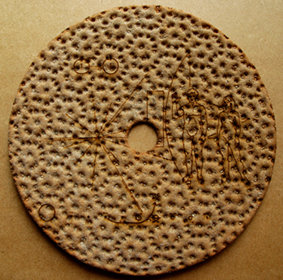Manual
dal 16/10/2008 al 14/11/2008
Segnalato da
16/10/2008
Manual
Gitte Weise Gallery, Berlin
Claire Healy & Sean Cordeiro. The tension lies between the way that the furniture was intended to be assembled and the manner in which it is assembled within the artworks: belying the problems inherent within any universal system of thought or language.

In 1972 Dr. Carl Sagan, Dr. Frank Drake and Linda
Salzman Sagan were given three weeks by NASA to
conceive, design and fabricate a message to
extraterrestrial life regarding who we are and
where we come from.
This message was taken aboard the space craft
Pioneer 10 and launched into space - eventually
travelling outside our solar system in the hope
that one day alien intelligence would discover
and decipher the message inscribed upon the 229 x
152mm gold aluminium alloy plaque.
The creation of a complex message that does not
utilise any pre-existing alphabet nor symbolism,
and communicates in a manner that was
non-culturally specific must have been a daunting
task - and the result has hence been heavily
analysed and criticised. But it was not the last
time such a task was given to a group of
individuals. The instructive diagrams that
accompany IKEA's flat packable furniture also do
not use any written language and the pictograms
used are an attempt to be non-culturally
specific. In theory this grants the furniture
created by IKEA access to a truly global market;
opening the possibility of the entire world
buying into the design and lifestyle
sensibilities of Sweden. The two projects differ
in that one is an attempt to communicate with
beings outside the Earth; the other is an attempt
to communicate with everyone on the Earth.
Our project brings these two symbolic systems
together to create a kind of hieroglyphics onto
the surface of pre-existing unassembled IKEA
furniture. We have used an electric router to
etch into the brightly coloured outer façade of
the furniture to reveal the inner golden colour
of the chipboard that lies beneath the melamine.
These seams of chipboard made visible have become
lines of symbology. The symbols used are an
amalgamation of the symbols used in the Pioneer
plaque and the actual pictograms used to describe
the construction of each unique piece of
furniture.
The tension lies between the way that the
furniture was intended to be assembled and the
manner in which it is assembled within the
artworks: belying the problems inherent within
any universal system of thought or language.
With this project; an amalgamation of two systems
of communication, we hope to highlight the
divergence of thought between two consecutive
eras. When the Pioneer was launched, there was
an ideal quest for progress, a time where there
was desire for the new, a society that was
concerned with change and encouragement for
advancement. Now we are living in a time where
the notion to seek for change has become
obsolete, there is a longing to hang onto a
status quo, a universal sameness. Like shopping
at IKEA, we comfortably slot into the dream of
aspiring for something everybody else in the
world has got.
Opening on Friday 17 October from 6 - 9 pm
Gitte Weise Gallery
Tucholskystrasse 47 - Berlin
Tuesday to Saturday 11 - 6
Free admission



